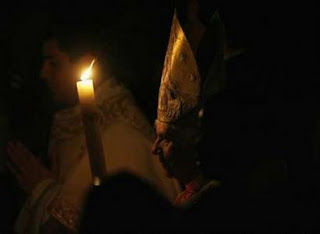Today we celebrate (belatedly) an extraordinary event that all mankind has been waiting for: a Savior that comes and lives amongst us. On the 25th of March, the Church celebrates this Joyful Mystery better known as the Annunciation. This silent but wonderful moment marks the time the Eternal one enters into time — for sure we have prayed for a savior, and Israel its Messiah, but to be 'reduced' to an embryo forming in the womb of a young girl from nowhere... no wonder we bow (or genuflect, even) when we recite the Incarnation in the Creed. So great is God's love for us that shows through this humility of our Lord!

At a glance, the world seems to say that we do not need a Savior. And like Lois Lane wrote, in the movie of Superman Returns, a Pulitzer-winning article on why the world doesn't need a savior, many of us or 'our brothers' have yet to face the fact that we do. Because our nature is fallen, we fail to redeem ourselves despite our best intentions.
It is a great feast day in the Church for many reasons. Just as we fall in awe of the Lord's goodness in this great mystery, this feast is also an occasion to reflect upon the humility of our Lady. It has been said many times that our Lady braved death by stoning if she were to be found pregnant and unmarried.
For those contemplating a Call from the Lord, our Lady is a paragon of a disciple and a shining star in your discernment. Was there euphoria at the annunciation? Perhaps, but I'd dare say there was more trepidation than euphoria for her. Was there complete understanding? Perhaps she understood better than the rest of us, as she is without original sin, her reasoning is not darkened by sins... yet surely she couldn't have anticipated the drama of the birth in a stable in a foreign unknown city, the prophecy of Simeon at the baby's presentation, the flight to Egypt, and lastly, the bitter Passion of her Son and His humiliating death. But none of that seems to matter. No lack of euphoria nor lack of complete understanding of her call prevented her, full of grace she is, to say her Fiat. St Bernard of Clairvaux imagined the entire heaven to be looking on, cheering her though no encouragement was necessary. And the entire heaven, which held their breath, sighed with relief, I imagined, when she said Yes. To bear the plan of God required her to say Yes everyday of her life. Victory of God's plan, one can say, was sealed with her obedience.
Again, to those who are contemplating the Call, temptations that it is perhaps 'better', that one is somehow more 'effective' being married and having a great family and raising many Christian children, sometimes do come. Is it possible to dedicate oneself joyfully and totally to God, and looking at having 'spiritual children' instead? Can one live renouncing earthly love to anticipate the heavenly marriage with the Lamb? The answer is yes, "possumus!" Not because anyone on their own is so strong but because God gives the grace to answer thus. I hear a resounding affirmation in today's Gospel:
“How can this be, since I have no relations with a man?”
“The Holy Spirit will come upon you... nothing will be impossible for God.”
--Luke 1:34, 37
 INTP - The Thinkers
INTP - The Thinkers



 Another example is found in the chapter immediately following the story of Eleazar. It also happened that seven brothers with their mother were arrested and tortured with whips and scourges by the king to force them to eat pork in violation of God’s law. One of the brothers speaking for the others said, “What do you expect to achieve by questioning us we are ready to die rather than transgress the laws of our ancestors.” Then follows a description of a whole series of the most horrendous tortures which these brothers endured. All the while the mother watched and encouraged her sons. The Scriptures then rightfully recognize the dignity of the mother: Most admirable and worthy of everlasting remembrance was the mother who saw her seven sons perish in a single day yet bore it courageously because of her hope in the Lord. Filled with a noble spirit that stirred her womanly heart with manly courage she exhorted each of them in the language of their forefathers. The mother was the last to die after all her sons. None of these family members was given a name. In purely secular terms we could come up with all kinds of reasons why the mother and her sons should have feigned eating pork in order to spare their lives. These seven sons could have been valuable resistance fighters. They could have raised up faithful sons and daughters to assure the survival of Israel. It could be argued that their faithfulness, which led to the destruction of the entire family, was an exercise in complete futility and even foolhardiness. Was their witness foolhardiness or was it courage?
Another example is found in the chapter immediately following the story of Eleazar. It also happened that seven brothers with their mother were arrested and tortured with whips and scourges by the king to force them to eat pork in violation of God’s law. One of the brothers speaking for the others said, “What do you expect to achieve by questioning us we are ready to die rather than transgress the laws of our ancestors.” Then follows a description of a whole series of the most horrendous tortures which these brothers endured. All the while the mother watched and encouraged her sons. The Scriptures then rightfully recognize the dignity of the mother: Most admirable and worthy of everlasting remembrance was the mother who saw her seven sons perish in a single day yet bore it courageously because of her hope in the Lord. Filled with a noble spirit that stirred her womanly heart with manly courage she exhorted each of them in the language of their forefathers. The mother was the last to die after all her sons. None of these family members was given a name. In purely secular terms we could come up with all kinds of reasons why the mother and her sons should have feigned eating pork in order to spare their lives. These seven sons could have been valuable resistance fighters. They could have raised up faithful sons and daughters to assure the survival of Israel. It could be argued that their faithfulness, which led to the destruction of the entire family, was an exercise in complete futility and even foolhardiness. Was their witness foolhardiness or was it courage?





.jpg)

.jpg)




